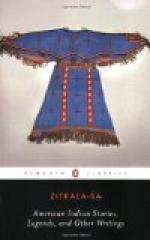Within this vast wigwam of blue and green I rode reckless and insignificant. It satisfied my small consciousness to see the white foam fly from the pony’s mouth.
Suddenly, out of the earth a coyote came forth at a swinging trot that was taking the cunning thief toward the hills and the village beyond. Upon the moment’s impulse, I gave him a long chase and a wholesome fright. As I turned away to go back to the village, the wolf sank down upon his haunches for rest, for it was a hot summer day; and as I drove slowly homeward, I saw his sharp nose still pointed at me, until I vanished below the margin of the hilltops.
In a little while I came in sight of my mother’s house. Dawee stood in the yard, laughing at an old warrior who was pointing his forefinger, and again waving his whole hand, toward the hills. With his blanket drawn over one shoulder, he talked and motioned excitedly. Dawee turned the old man by the shoulder and pointed me out to him.
“Oh, han!” (Oh, yes) the warrior muttered, and went his way. He had climbed the top of his favorite barren hill to survey the surrounding prairies, when he spied my chase after the coyote. His keen eyes recognized the pony and driver. At once uneasy for my safety, he had come running to my mother’s cabin to give her warning. I did not appreciate his kindly interest, for there was an unrest gnawing at my heart.
As soon as he went away, I asked Dawee about something else.
“No, my baby sister, I cannot take you with me to the party tonight,” he replied. Though I was not far from fifteen, and I felt that before long I should enjoy all the privileges of my tall cousin, Dawee persisted in calling me his baby sister.
That moonlight night, I cried in my mother’s presence when I heard the jolly young people pass by our cottage. They were no more young braves in blankets and eagle plumes, nor Indian maids with prettily painted cheeks. They had gone three years to school in the East, and had become civilized. The young men wore the white man’s coat and trousers, with bright neckties. The girls wore tight muslin dresses, with ribbons at neck and waist. At these gatherings they talked English. I could speak English almost as well as my brother, but I was not properly dressed to be taken along. I had no hat, no ribbons, and no close-fitting gown. Since my return from school I had thrown away my shoes, and wore again the soft moccasins.
While Dawee was busily preparing to go I controlled my tears. But when I heard him bounding away on his pony, I buried my face in my arms and cried hot tears.
My mother was troubled by my unhappiness. Coming to my side, she offered me the only printed matter we had in our home. It was an Indian Bible, given her some years ago by a missionary. She tried to console me. “Here, my child, are the white man’s papers. Read a little from them,” she said most piously.




